Dieser Text ist zur Zeit nur auf Englisch verfügbar...

How do humans make sense of oceans and coasts? How may varied marine epistemologies and ontologies along the equator be diversely explored?
Since the paradigmatic ‘oceanic turn’ profoundly influenced the humanities and the social sciences, we ask how largely qualitative ethnographic marine research may further help in ‘de-terrestrialising the Academy.’ Moreover, we question how inter- and trans- disciplinary marine social science research contributes towards realising a more inclusive, interconnected and pluriversal world. These lines of inquiry constitute the key conceptual, methodological and empirical questions that guide the ZMT´s Development and Knowledge Sociology (DKS) Working Group, led by Prof. Dr. Anna-Katharina Hornidge.
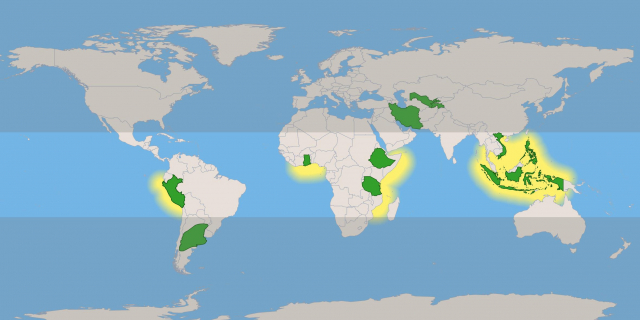 |
Research areas (yellow) and PhD fieldwork regions (green) |
Research Regions
The development of our research agenda is informed by recent and on-going fieldwork by cluster members together with long standing partnerships in a number of geographical areas: Asia Pacific (Indonesia, Singapore, Vietnam and the Philippines), Central Asia and the Persian Gulf (Uzbekistan, Tajikistan and Iran), Latin America (Argentina, Brazil and Peru), East and West Africa (Ghana, Ethiopia and Tanzania).
Interdisciplinarity
The working group brings together researchers from a diverse range of disciplines including sociology, development studies, coastal geography, social anthropology, Southeast Asian and theatre studies, driven by a mandate to produce both disciplinary-based basic, as well as problem- and real-life-oriented research.
The epistemic pluralism of the collaborative cluster is further reflected in methodologies encompassing field-based ethnographic research, narrative and discourse analysis (in particular SKAD), case-study and Participatory Learning in Action approaches, ‘follow-the-moving target’ methods, oral history and visual ethnography, weaving together Post-Area Studies paradigms, Grounded Theory, interpretive phenomenology, alongside post-development, postcolonial and decolonial currents.
Three interlinked thematic pillars form the basis of our research:

Marine Science Studies – Discourses of Knowledge
Oceans, coastal zones and other marine spaces are complex sites of hybrid human-nature interactions. As sites of intense liminality, mobility and political contestation, they set the context for complex transboundary debates on sea-level rise, ocean acidification, sand and salt mining, re-territorialisation, migration and discovery of new resource frontiers which continue to evolve along coastal zones and the high seas. Our work focuses on how local, regional and global interests and transformations shape contemporary discourses and practices around ‘sustainable development’, socio-technological innovation, growth and the Blue Economy, together with changing forms of resource extraction and governance. Our research engages with the diversity of forms of knowledge on marine spaces, underpinned by the shared commitment towards rethinking linkages between land and sea, and across socio-political and ecological sustainability concerns. Moreover, we study the manifold ways in which marine and coastal spaces are materially, relationally and symbolically lived (as ontologies), while shaping novel forms of transcultural inter- and transdicipinary research praxis that contribute to what we would like to call ‘One World-research’.

Oceanic Futures & Foresight Studies
The theorising and empirical study of ideas, practices and the imaginaries of (multiple) futures remains an ever-evolving research field that cuts across the interdisciplinary sustainability sciences as well as the theoretical social sciences and the humanities. As concepts such as ‘Postnormal Times’ (Sardar, 2013 & 2015) gain renewed interest or new heuristic purchase, scientific and civil society debates on what is seen to be normatively desirable (for example the notion of ocean governance for the planetary futures we want), by whom and how to get there, continue to unfold. Our work centres on understanding how assemblages of technologies and institutions, together with traveling policies, practices and discourses (e.g. blue-prints and modelling methodologies) shape the ways in which marine spaces and polities are presently being governed, together with the types of normed orders that are likely to prevail in the future. Moreover, cluster members are making important contributions to the understanding of ‘futuring’ as a dynamic, multi-stranded and contested process, drawing insights from across knowledge sociology, political ecology and science, technology and innovation studies.
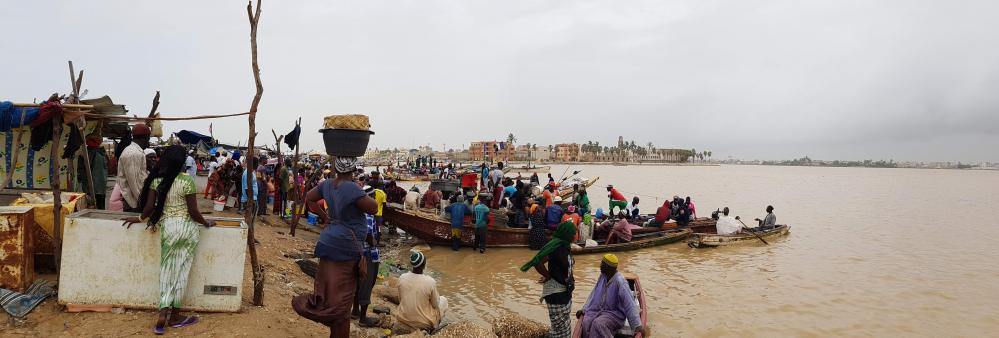
Coastal Transformation Studies
The call for socio-ecological transformation has traditionally embodied questions around human adaptation, resilience and trajectories of anticipatory learning. Over the past decade, discourses around rethinking diverse adaptation and transformation pathways combined with the acknowledgement to widen new and hybrid spaces for collaborative decision-making have patterned what can be broadly identified as Transformation Studies. Research in this area focuses on the varied multi-scalar politics, discourses and technics of how coastal change is being imagined and re-designed in the wake of the ‘unknown unknowns’ responsible for the increased needs to manage uncertainties. We also engage with a host of phenomenological questions underpinning how fluid, interactive coastal spaces themselves are being reconfigured – through processes of categorisation, mapping and socio-technological modification - in ways that have far-reaching impacts on human-nature entanglements, and lived realities patterning vastly dissimilar coastlines.
Vacancies
| Position | Deadline | |
| Master in the WG Development and Knowledge Sociology and the WG Submarine Groundwater Discharge | Advertisement remains open until a suitable candiate is selected | |
| Doctoral Candidate Position in Development and Knowledge Sociology | Advertisement remains open until a suitable candiate is selected |
Teaching (WS 2019/2020)
Development Sociology: Theory and Policy in Practice. Anna-Katharina Hornidge. University of Bremen, VAK: 08-29-3-SP12-1.
Development Theory in Practice: Empirical Examples and Methodological Tools. Anna-Katharina Hornidge. University of Bremen, VAK: 08 -29-3-SP12-2.
Introduction to Maritime Anthropology. Rapti Siriwardane-de Zoysa. University of Bremen, VAK: 09-50-M4-9.
Winter School: Ocean Governance for Sustainable Marine Ecosystems. Leibniz Centre for Tropical Marine Research (ZMT) & International Ocean Institution (IOI). Bremen, February 16th - 22nd, 2019 (registration open).
Just published
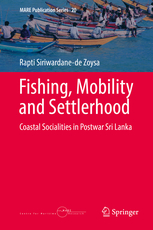 |
SIRIWARDANE-DE ZOYSA, R. (2018): Fishing, Mobility and Settlerhood: Coastal Socialities in Postwar Sri Lanka. Cham: Springer. ISBN 978-3-319-78837-1. DOI: 10.1007/978 -3-319-78837-1. |
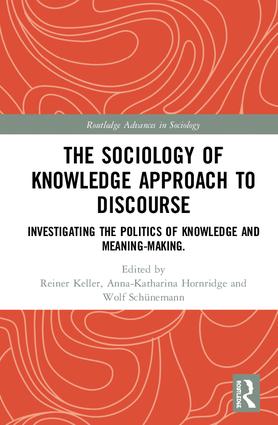 |
Keller, R., HORNIDGE, A.-K. & Schünemann, W.J. [Ed.] (2018): The Sociology of Knowledge Approach to Discourse. Investigating the Politics of Knowledge and Meaning-Making. Milton Park: Routledge. ISBN: 978-1-138-04872-0. |
| Gissi, E., Portmann, M., HORNIDGE, A.-K. (2018): Un-gendering the Ocean. Why women matter in ocean governance for sustainability. In: Marine Policy 94, 215-219. DOI: 10.1016/j.marpol.2018.05.020. | |
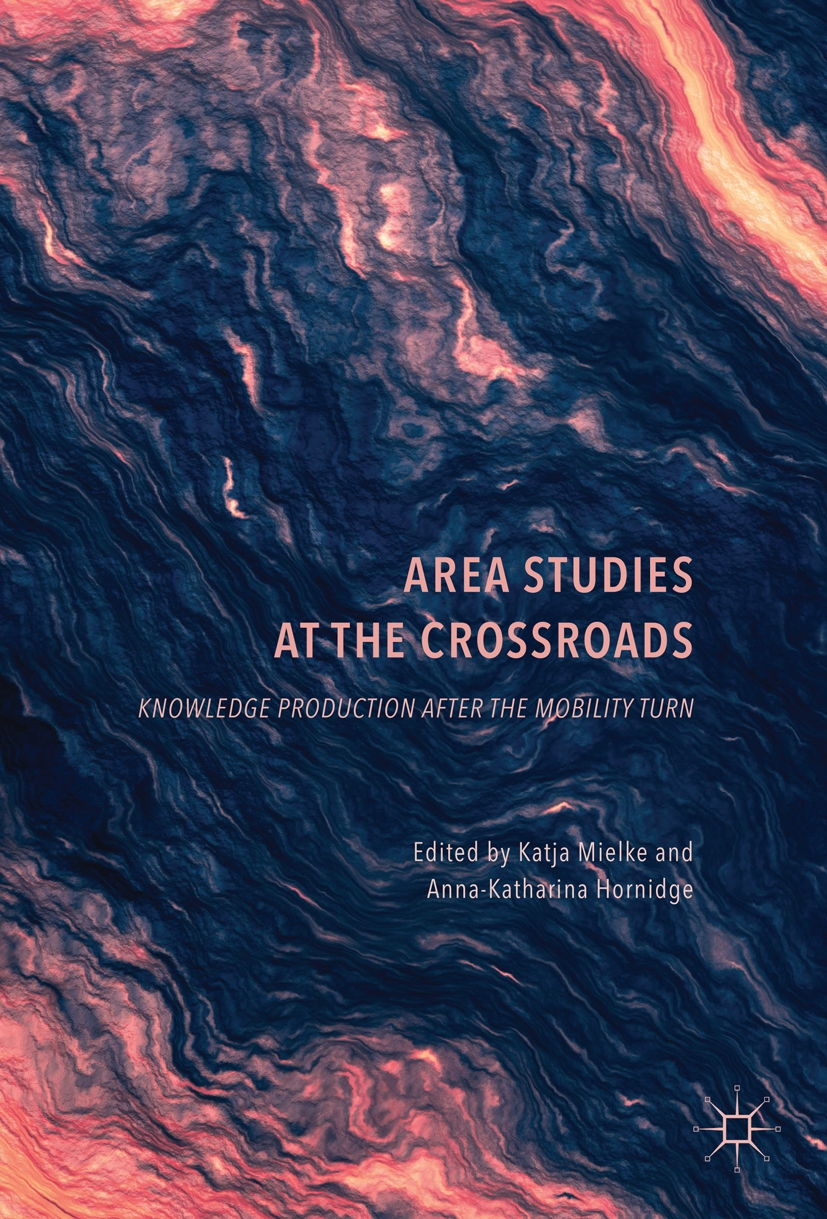 |
Mielke, K. & HORNIDGE, A.K. (eds.) (2017): Area Studies at the Crossroads: Knowledge Production after the Mobility Turn. New York: Palgrave MacMillan. ISBN: 978-1-137-59834-9. |
|
SIRIWARDANE, R. and HORNIDGE, A.-K. (2016): Putting Lifeworlds at Sea: Studying Meaning-Making in Marine Research. In: Frontiers in Marine Science 3(197), 1-13. DOI: 10.3389/fmars.2016.0019710.3389/fmars.2016.00197. |
|




